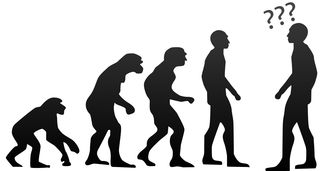Evolutionary Psychology
Evolutionary Psychology Applies to Everyone
Understanding our evolutionary history can help us function better now.
Posted March 14, 2017
“Nature...is what we are put in this world to rise above.” —Katharine Hepburn, African Queen (1951)

While evolutionary theory has had a long-standing impact upon the natural sciences, the implications of this theory have only recently impacted the subfields of psychology (e.g., cognitive neuroscience, learning theory, social psychology, perception). Despite the relatively recent influence, the impact of evolutionary theory on these subfields has been enormous. However, one of the largest areas within the field, clinical psychology, is only in its infancy in applying evolutionary theory as a framework.
The mission of this blog is to discuss how one can use modern evolutionary thinking to increase our understanding of the evolved nature of the human mind and how this conception influences the broad field of clinical psychology (i.e., our view of human nature, theory of human suffering and psychopathology, and strategies that can be used to improve one’s life). With an eye on synthesizing the two main ingredients—evolutionary psychology and clinical psychology—with a dash of cognitive neuroscience and existential philosophy—this blog will address the following three essential questions.
First, what is the nature of the human mind—that is, what is human nature? All species have a nature unique to their struggle to survive and mate (e.g., you know that a dog has a different nature than a lion—evolutionary psychology posits that humans have a specific nature—relatively universal to all humans. Central to humans’ nature is the experience of emotions—clearly universal to all humans despite race, culture, etc. From an evolutionary perspective emotions are adaptations that successfully guided humans to solve problems faced throughout their evolutionary history. So the question arises: What is normal emotional functioning from an evolutionary perspective? What do humans care about—reflected in the triggering of emotional experiences—and why? To answer this question one must examine evolved psychological adaptations (EPAs) which have been increasingly identified by evolutionary psychologists to define an empirical evolution-based human nature. EPAs are literally the contents of our mind that exist because of natural selection.
Second, what role do these EPAs play in human suffering in general and in the development and expression of psychopathology (e.g., anxiety disorders, depression, eating disorders, addictions, relationship distress, general life dissatisfaction)? Evolutionary theory hypothesizes that if chronic negative emotional states are being activated then the individual is either not satisfying, or believes they are not satisfying, an important evolutionary motive. This motive may be conscious or unconscious to the individual but guides their behavior nevertheless. Perhaps one of the most important contributions of evolutionary theory is examining how particular EPAs interact with an unprecedented rapidly changing environment. Specifically, the current context that we all function in is far from that which our mind was originally conceived for (think living in a city and the impact of technological advances, etc. versus a hunter-gatherer lifestyle). This idea is known as mismatch theory which is a powerful framework that has significant implications for the rise in human suffering and psychopathology (and physical illnesses such as metabolic disorders, obesity, heart disease) that we are observing in the present environment. Indeed, despite all of our attempts and billions of dollars spent to decrease emotional disorders and increase the population’s well-being in general every indicator suggests these problems (i.e., mental illness, general distress and dissatisfaction) are increasing! Thus the need to consider a reset.
Third, with an increased understanding of the role of evolutionary theory in how we define human nature and the underpinnings of human suffering: What implications does this have for making changes to improve one’s life? And perhaps most relevant to therapists: what implications does this have with regard to psychotherapeutic treatments (e.g., cognitive behavioral therapy, psychodynamic therapy, emotion-focused therapies)? Can, or must, they be modified in some way to increase their efficacy based upon insights from evolutionary psychology? If so, how? Can evolutionary theory provide a framework to unify a vast majority of psychotherapeutic approaches and perhaps capitalize on each treatment’s particular value?
I look forward to considering these broad questions by tackling many of the details that underlie each of them in future blogs. I hope you will consider following or subscribing to this blog and sharing it with others who you may believe would be interested in the content. Despite this first blog being a bit dry as I introduce this topic, my ultimate goal for future blogs is to provide news that you can use!


